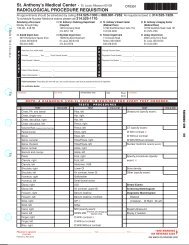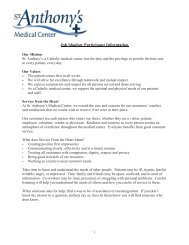Download Cancer Care Center Annual Report - St. Anthony's ...
Download Cancer Care Center Annual Report - St. Anthony's ...
Download Cancer Care Center Annual Report - St. Anthony's ...
- No tags were found...
Create successful ePaper yourself
Turn your PDF publications into a flip-book with our unique Google optimized e-Paper software.
Treatment of colorectal cancerColon <strong>Cancer</strong>: Preventable • Treatable • BeatableColorectal cancer is the third most common cancer and the secondmost common cancer killer in the United <strong>St</strong>ates, which, in 2012,is an estimated 143,000 new colorectal cancers and 52,000 deaths.The risk of developing colorectal cancer increases with age. All menand women age 50 and older are at risk of developing colorectalcancer, and should be screened. Those with a personal history ofinflammatory bowel disease or family history of colorectal cancer orpolyps should be screened before age 50.At <strong>St</strong>. Anthony’s Medical <strong>Center</strong>, rectal cancers are treated with ateam approach which includes the colon and rectal surgeon, medicaloncologist and radiation therapist. Radiation therapy is used in mostrectal cancer cases, and in the few instances of colon cancer when it isnot possible, or safe, to surgically remove all of the cancer. Surgeonsworking with the radiation therapists utilize different techniques toallow for the delivery of the maximum appropriate dose of radiationtherapy while minimizing the adverse effects to the surroundingtissues.Current screening methods include one or more of the following:fecal occult blood testing, flexible sigmoidoscopy, double contrastbarium enema and the gold standard - colonoscopy. Colorectal cancerscreening costs, including colonoscopies, are covered by Medicare andnearly all commercial health plans.Colorectal cancer can be cured in up to 90 percent of patientswhen discovered in its early stages. Approximately 40,000 lives ayear could be saved through widespread adoption of colon cancerscreening and early treatment in men and women.Symptoms from colorectal cancer may include any or all of thefollowing: bleeding per rectum, dark black stools, change in stoolcaliber, tenesmus, lower abdominal pain, recent change in bowelhabits towards diarrhea or constipation, and unintentional weightloss. However, most patients identified to have colorectal cancer haveno symptoms. This is why screening is so important.Ten percent of all colorectal cancers are identified in patientsyounger than age 50; therefore, when these patients do present withthe symptoms associated with colorectal cancer, they should beinvestigated thoroughly.Colorectal cancer, like most cancers, is staged at four differentlevels. Each stage carries different treatment recommendations andprognoses. Although staged the same, treatment recommendationsfor colon cancer and rectal cancer are different.<strong>St</strong>age I colorectal cancers are those where the cancer penetratesonly a portion of the bowel wall. Colon resection is the main stay,without any additional therapy, and yields a five-year survival rate of74- 93 percent. <strong>St</strong>age II colorectal cancers invade through most, ifnot all, of the bowel wall or directly invade an adjacent organ. Colonresection provides a significant cure rate with five-year survivalDavid Schuval, M.D.9













